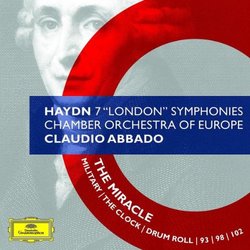Pass in favor of Davis, Harnoncourt, Bruggen, Dorati, Szell,
Prescott Cunningham Moore | 09/02/2009
(3 out of 5 stars)
"Approaching this set I am reminded of the story of the elderly couple returning from dinner. The husband turns to the wife and says, "The food was terrible." The wife replies, in kind, "And such small portions." Indeed, this present set is the musical equivalent of bad food and small portions.
There is nothing particularly wrong with these performances. Take, for example, Abbado's punchy reading of the Miracle Symphony. The slow introduction is beautifully shaped, the allegro is brisk, bumptious, and full of good fun, Abbado adding an extra dose of rhythmic drive with crisp articulations. At the same time, however, trumpets fails to cut through the texture as they should, violins - placed on the left, not as Haydn intended them to be situated - dominate the texture, and Abbado's involvement at times can become noisome. His fussy treatment of tuttis is mannered, he adds articulations not found in the score, and the performance as a whole, while exciting, never quite come across as humorous.
At the same time, if DG is going to release a Haydn London Symphony Cycle from these forces, why did the set stop at seven? DG should have at least allowed Abbado to record all twelve. I am not sure if Abbado's health problems prevented completion of this set or if it was abandoned for other reasons. No matter, because with so many cycles of the symphonies available, it seems the only persons interested in this set would be people needing to hear Abbado in this music.
And for some, that may be enough. However, those curious as to what Abbado does with Haydn would be better served buying Colin Davis's Concertgebow set on Phillips. Davis adds just as much punch as Abbado, but has that dose of "tongue in cheek" humor conspicuously absent from this set. Additionally, the Concertgebouw is simply a better ensemble, with more brilliant brass, idiomatic wind playing, and more colorful strings. Harnoncourt's Concertgebow set is equally tempting. While his Drumroll and London Symphonies are recorded in less-than-ideal sound, Harnoncourt delivers some stunning performances, including my personal favorite recording of the Surprise Symphony, a performance that hangs fire from start to finish. Fans Bruggen's period instrument set is also a better choice, featuring period instruments, stereophonically placed violins, and hard mallets for the timpani. Bruggen's interpretations feature broader tempos in the slow movements, but quick minuets, and stunning finales. His Clock Symphony is really something, a performance that beats Abbado's due to incisive wind playing and that extra dose of energy. Bruggen's One-Hundred-Second also beats Abbado, Bruggen's antiphonally placed violins really showcasing Haydn's brilliant interplay between the first and second violins as they toss the music across the sonic landscape. Sony's re-release of George Szell's London set is also more attractive than Abbado's, as is Thomas's Fey's on-going cycle, Dorati's classic performances, and Fischer's London set with the Austro-Hungarian Haydn Orchestra.
In all fairness to Abbado, this is a fine set, one that would have been quite attractive twenty or thirty years ago. But there are too many fantastic performances of the complete London Symphonies on the market today that have a much stronger point of view. Pass."

